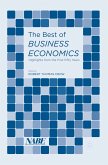This book combines elements of economic and business history to study business ethics from antiquity to the nineteenth century. This book begins with so-called primitive people, showing how humans began to exchange goods and commodities from trade as a way to keep peace and prosper. The ancients considered the value and ethics of business, and many of their reflections influenced medieval Catholic thinkers and business participants. Protestants elevated working and profit-making to the respectable and virtuous, and some groups, such as Quakers, came to exemplify good business ethics.
This book draws on the work of economists and historians to highlight the importance of changing technologies, religious beliefs, and cultural attitudes, showing that what is considered ethical differs across time and place.
Dieser Download kann aus rechtlichen Gründen nur mit Rechnungsadresse in A, B, BG, CY, CZ, D, DK, EW, E, FIN, F, GR, HR, H, IRL, I, LT, L, LR, M, NL, PL, P, R, S, SLO, SK ausgeliefert werden.









